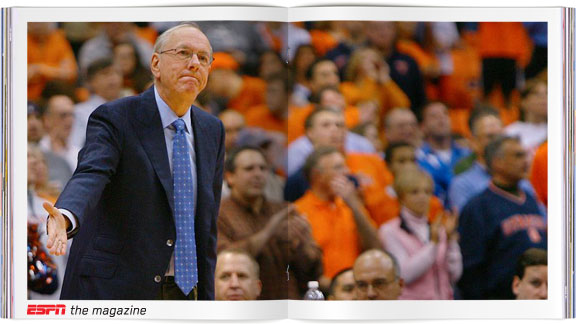 Nate Shron/Getty Images
Nate Shron/Getty ImagesWHEN THE COLLAPSE COMES, rarely is it by an explosion, the final blow that provides both the end and the new beginning. More often, it happens by decay, the initial sign just a dime-size water stain on the ceiling. Only later, far too late, does the extent of the rot become clear.
The NCAA -- under assault from its college football programs that are bigger than it, fearful that its basketball programs will realize the same, facing its long-standing hypocrisy of generating billions at the expense of its athletes -- knows its empire is collapsing. Now the child sexual abuse scandals at Penn State and Syracuse have destroyed another previously impervious front: the myth of coach as great moral influence.
When it was time to make good on the promise of being character builders, of being leaders, two coaching legends, Joe Paterno and Jim Boeheim, could not have come up smaller. With an alleged sexual predator in his midst, Paterno appears to have done the bare minimum of his responsibility, alerting his superiors in 2002 and then presumably going back to game-plan for Purdue. According to an interview with The New York Times, Jerry Sandusky said Paterno never confronted him about allegations that he sexually abused children, even when the alleged offenses occurred in the Penn State locker room.
Two weeks after the Sandusky story broke, two former ball boys at Syracuse appeared on ESPN to accuse longtime Boeheim assistant Bernie Fine of sexually assaulting them. (A third accuser later came forward.) Boeheim showed no compassion or concern for the young people he ostensibly molds, instead revealing himself a bully. His first reaction was to accuse the alleged victims of lying and extortion, and then he seemingly framed the scandal as a potential "distraction," as if it were something to be tuned out in order to concentrate on the important business of, say, preparing to play Georgetown for the Big East championship.
“Not one of these millionaire motivators has stepped forward to offer more than token words to potential victims.”
In a universe where players show up for coffee and are gone by lunch, the coach is the only stable element the college game has, outside of the venerable universities themselves. He generously profits from his image as leader, through outsize salaries, sneaker deals and book and motivational tours. The image is a facade. Paterno and Boeheim are at the podium right now, but the other supposed leaders of young men -- Krzyzewski and Saban, Thompson and Miles, Williams and Calhoun -- have failed as well. Some offered heartfelt sympathy for the victims, but virtually all have run for cover while the rest of us confront the real message of the Penn State/Syracuse mess: Because coaches are given ultimate authority from parents ("Do what the coach says, son") and spend off-hours in private with children without supervision, sports can be as ripe a breeding ground for predators as the church or the Boy Scouts. Not one of these millionaire motivators has stepped forward to offer more than token words to potential victims. Not one proactive gesture to find out whether abuse is widespread, not one courageous act of real support, to tell children it isn't their fault, to bring them into the light, to lead.
To date, amid the great institutions of higher learning, only one voice has actually been worth listening to: that of Nebraska football coach Bo Pelini. No, he hasn't taken any meaningful actions, but while vouching for Paterno's character, he at least saw Penn State in its larger context. "To be honest, I didn't think the game should have been played," Pelini said last month, after his team beat the Nittany Lions in the wake of Paterno's firing. "The situation going on is bigger than football, bigger than the game just played."
Paterno, 85 years old and painfully disgraced, never quite grasped the message. Finally, but too late, Boeheim got it, spin-doctoring himself into decency at a recent news conference -- only after he was browbeaten into realizing this isn't about him.
Like the rest of the NCAA foundations that have proven to be fraudulent, there's no believing in the coach-as-guide ideal anymore. The lie of it has been exposed, the rot setting in, as the game's biggest, richest names run from perhaps the most damaging crisis in the history of college athletics, counting their money, staying quiet, nervously checking the headlines in the hopes that their program isn't next.





